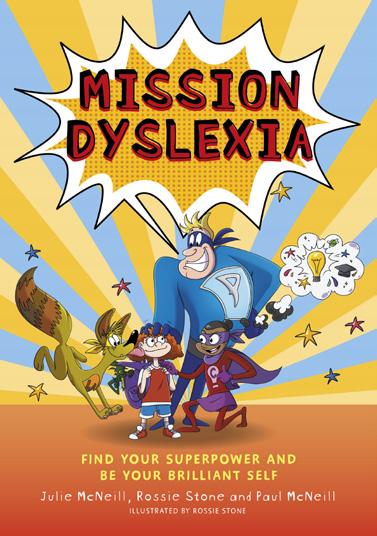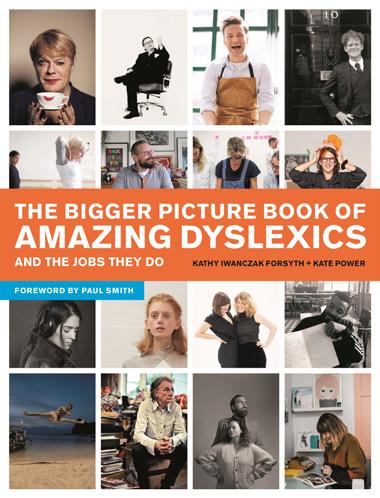
11 minute read
Empowerment
2DYLSEXIA
NEW
Advertisement
7–12 years * £14.99 * Mar 2021 * PB * ISBN: 9781787752962 * Fully illustrated with colourful cartoons and pages for the child to draw and write in.
Mission Dyslexia
Find Your Superpower and Be Your Brilliant Self Julie McNeill, Rossie Stone and Paul McNeill Illustrated by Rossie Stone, Dekko Comics
Meet Creatia, Persisto and Willforce. They are strong, determined and creative, and they represent the strengths that dyslexia can bring to your life. Together they encourage you to use your skills and talents to be confident in what you do - and shrink the villain Mr Dyspicibilia!
This is a fun and interactive resource for grown-ups and children to work through together, with drawing and writing activities and examples to open up helpful discussions and find practical solutions that put the dyslexic child’s selfesteem and self-understanding at the fore. The strategies in the book are brought to life through the three superheroes who help you develop a child’s unique strengths to tackle the everyday challenges they may experience with reading, writing, staying organised or keeping track of the time. The colourful illustrations, cartoons and dialogue encourage children to name their feelings, identify challenges and recognise their own strengths in any situation.
– Cathy Magee, chief executive of Dyslexia Scotland


–Margaret Rooke, author of ‘Dyslexia is my Superpower (Most of the Time)’
I can’t believe I’m here. There were so many times I felt like giving up. Thank you for always believing in me.
Isabella
You’ve earned every step. You worked hard even when things were tough. We knew you could do it.
Of course, I didn’t do it on my own. Can you spot a few of my friends in the crowd?
Mum
Isabella
Oh, yeah, I see them! Willforce, Creatia and Persisto were always there when you needed them. He was always there too, though, wasn’t he? Mr D – if you look very closely, you will spot him too.
Yes, I see him. He doesn’t look so scary from up here, though. Let’s give him a wave.
Isabella Dad
16
CHAPTER 3
Mr D! Mr D!
32 Now that we have identifi ed all of your fabulous strengths and know where to go if we need to ask for help, I suppose it might be time to introduce this guy. You might have spotted him lurking on the pages of the previous chapters.
CHAPTER 4
Time’s Up! Time’s Up!
Now, if you’re anything like me, telling the time can be a little bit tricky, and don’t get me started on getting to places at the right time or completing tests before the bell goes for lunch.
40
Yes, it could be to do with the way you process information – that’s how you read or hear the instructions somebody gives to you. That’s what happens to me.
Some people with dyslexia prefer instructions to be broken down, instead of receiving all the information at once. Maybe that’s you? Do you nd it easier when you are asked to do one thing at a time?
Do you ever struggle with time disappearing? I know I’ve got 30 minutes, but when I look up, I’ve only got ve le and I’ve no idea where the other 25 have gone!
Some people prefer to be able to see how much time they have le – there are lots of great visual timers or countdown clocks that can be set to light up when half or all your time is up. Maybe that’s you? Would it help to have a timer that ashed green, orange or red to let you know when time is counting down?
43
CHAPTER 2
We Are the We Are the “Heroes” “Heroes”
I’ll let Creatia, Willforce and Persisto tell you a bit more about him.
Don’t forget to look out for him in each of the chapters and see if you can work out what is happening to him as the book progresses.
Don’t say it, Persisto… Don’t do it!
We called the chapter a er him; we have to tell them.
I doubt they’ve even read that bit. It’s ne, honestly – we can just miss him out. just miss him out.
Does this ever happen to you?
This should take you 20 minutes.
Twenty minutes later…
Time’s up!
Eh? I’m still trying to read the question.
Actually, you’re right, Creatia. I always have extra time to complete tasks for this reason. You might be allowed some extra time, or somebody to write for you or read the questions for tests. Make sure you speak to your school about this.
The truth is that di erent strategies will work for di erent people. Find out what works best for you and use it. This will be particularly helpful later in life when you are working towards exams or planning your day at school or work. Forgetting to plan or not asking for help are the most common reasons to run out of time. Remember to work with your teacher or grown-up to make sure you have planned out enough time to complete tasks – and think about time for breaks if you need them.
The most important thing to do where time is concerned is breathe. Sounds obvious, doesn’t it?
When you have a task or a job to do, the rst thing you should do is take a deep breath.
44

NEW
12+ years * £15.99 * Sep 2020 * PB * ISBN: 9781785925849 * Beautifully illustrated in full colour with photos of the amazing dyslexics at work
The Bigger Picture Book of Amazing Dyslexics and the Jobs They Do
Kathy Iwanczak Forsyth and Kate Power Foreword by Paul Smith Funny and beautifully designed, packed with photos, this book puts amazing dyslexics and the jobs they do under the spotlight. The reader draws inspiration and insight from the stories which highlight the dyslexics’ low and high points, people who inspired them, their coping strategies, strengths, eureka moments and advice to younger selves.
– Deyan Sudjic OBE, Director Emeritus, Design Museum
Reading Well 7–15 years * £13.99 * Sep 2017 * HB * 96 full-colour illustrated pages * ISBN: 9781785923302 * World rights available
The Illustrated Guide to Dyslexia and Its Amazing People
Kate Power & Kathy Iwanczak Forsyth Foreword by Richard Rogers
Seeing inside Dyslexia and how it feels - challenges, solutions, and amazing people
– Shirley Cramer, CEO of Royal Society for Public Health (RSPH) & Ex-CEO of Dyslexia Action
It means a difficulty with words.
Dyslexia
comes from the Greek language: ‘Dys’ meaning difficulty, ‘lexia’ meaning words.
It’s not just about finding reading, writing and spelling tricky. It can also affect speaking, remembering, understanding, speed, movement and basic maths. It can range from mild to severe.
The great news is that with good teaching most dyslexics learn to read.
Some early clues to dyslexia
But not a definitive checklist that you are dyslexic.
17
Nippers
Not crawling as a baby Late to start talking Putting shoes on the wrong feet Falling over and bumping into things
Whippersnappers
Wrongly accused of not listening or paying attention Surprising people by the really clever and imaginative things you say
26
Noah does not always know what letter shapes sound like
To read you need to know the sound of the letter you are looking at. This is called letter and sound association. Sound familiar?
I recognise the letter but I can’t remember what it sounds like. It’s the duh sound.
at ain Let’s get inside your head!
Using brain scans, scientists can see that dyslexics think in a different way. This can have some rather lovely side effects.
Hey Brainy
Creative Imaginative Story telling Inventive Connecting ideas Visionary Seeing the bigger picture Problem solving Free thinking Thoughtful Thinking in 3D Passionate Don’t be pigeonholed by dyslexia.
23
30 If you think your child might be dyslexic
Talk to their teacher and the school’s learning support team. Check their eyesight at the optician. Get advice from their family doctor. Find a professional who can assess for dyslexia. Check online for your national dyslexia organisation to get guidance and support.
While assessing for dyslexia, check for other learning difficulties, like Asperger syndrome (AS), attention deficit hyperactivity disorder (ADHD), dyspraxia and dyscalculia, as you can have dyslexia alone or alongside one of these.
Poppy needs to see a word many times before she remembers it
Most non-dyslexics only need to see a word about 6 times before they recognise it, but some dyslexics need to see a word again and… Non-dyslexic straight thinking
A
B
C
Goal !
24
Have your say
This part of the book is to help you understand what dyslexia means for you, and to help you explain to others how dyslexia affects you and your learning. On the following pages, you will find empty speech bubbles. Tick or cross if you can relate to what’s been said and perhaps talk about how it makes you feel. You will also find, at the bottom of each page, red boxes containing top tips and black boxes with useful website addresses.
Pencil at the ready!
32 Top Tips
Websites we found useful
Architect
Can you walk through a building in your mind that hasn’t been built yet?
Richard Rogers learnt early on that when people said something was impossible, he shouldn’t believe them. This made him a trier and he’s still trying.
Photo: Petr Krejci Pompidou Centre photo: Katsuhisa Kida. Richard Rogers photo: Kinga Koren/RSHP Le Centre Pompidou – magnifique!
BESTSELLER 8+ years * £12.99 * Sep 2017 * PB * ISBN: 9781785922992 * World rights available
Dyslexia is My Superpower (Most of the Time)
Margaret Rooke Foreword by Catherine Drennan and Loyle Carner Containing over 100 in-depth interviews with school children and young adults living with dyslexia, this collection depicts the significance of confidence and self-esteem in propelling children with dyslexia to achieve personal success. The children supply their own illustrations; a handy hints guide; and their own advice to educators.
– School Library Journal
8–99 years * £12.99 * Jul 2016 * PB * 46 B&W photographs * ISBN: 9781785920608 * World rights available
Creative, Successful, Dyslexic
23 High Achievers Share Their Stories Margaret Rooke Foreword by Mollie King
High achievers from the acting, singing, athletic and business worlds come together in this collection to talk about the challenges and strengths that dyslexia has presented them with throughout their lives
9–13 years * £9.99 * Oct 2019 * PB * Illustrated in B&W throughout - over 40 B&W illustrations
* ISBN: 9781785924422
Diary of a Dyslexic School Kid
Alais Winton and Zac Millard Illustrated by Joe Salerno This positive and relatable diary of a dyslexic teen covers school life, bullying, tests and homework, with warmth, humour and insight. Based on the authors’ real-life experiences, it shows kids and young teens with dyslexia that they are far from alone in their experiences.
DIARY OF A DYSLEXIC SCHOOL KID
STUFF I’M INTO
Drama – I’m a superstar and I’m gonna be proper famous one day. I.T. – THAT’S COMPUTERS (if you are still reading this mum, even though I told you not to). Design Tech – I get to make super cool stuff in that class. Riding my scooter – obvs. My x-box. Getting away with stuff that mite have been my fault. Adventures.
Art.
16
tUEsDAy 7tH OCtObeR
Still couldn’t do stupid homework.
So I just wrote random about Shakespeare living in the olden days.
When people wore different clothes and everything smelt really bad, ’cos they have proper toilets – yuk!!!! my
didn’t
Tuesday 7th
In History today Sir asked me how many wives did Henry the 8th have and I said ‘more than he needed’.
Everyone apart from Sir laughed.
37
wednESdAY 29TH OcTOber
Jordan keeps making sly little comments in class, saying I’m dumb and stuff but the teachers never hear him.
Soo he never gets into trouble, but if I say something back I always get into trouble.
Mum says she is pulling her hair out about how I act in class, but she looks like she still has loads of hair.
Wednesday 29th
Parent’s evening. Mum is still having a go ’cos I lost the letter about this.
We are running late ’cos she can’t find her keys. It is well stressville.
43
FRIDAy 30TH JAnuAry
She said ‘Oh Cal, I’m just disappointed’.
She asked how I was doing in English.
I told her I was doing okay, I didn’t wanna make her even sadder.
Friday 30th January
So the great news is we’re going do a play.
I’m gonna be in it for def.
The bit that sucks is we’re gonna do Shakespeare.
What I hate about Shakespeare is:
He didn’t have a speare.
His name is hard to spell.
65
– Alison Patrick – author of The Dyspraxic Learner: strategies for success










